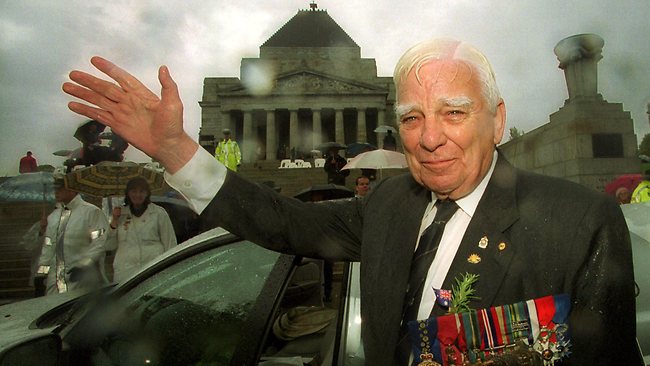Bruce Ruxton is one of my heroes. I never met the man and these notes are drawn from personal recollection of some of his better known controversial escapades with a bit of research added in.
He was born too late to be able to become a hero in the traditional sense. He joined the Army in 1944 and was assigned to the Survey Corps of the Royal Australian Engineers, a natural progression from his civilian occupation. Towards the end of the war, he was transferred as a rifleman during the Borneo campaign.
As detailed by his biographer, Private Ruxton VX94379 was assigned as a reinforcement to the 2/25th Battalion. He trained in Queensland, and was then attached to the 2nd Australian Field Survey Company.
In April 1945, Ruxton was sent ahead of the rest of the 2/25th to the island of Morotai in the Dutch East Indies, where he found spiders ''as big as pineapples''. From Morotai, he went to Balikpapan, an oil port in Borneo. There he saw action as a rifleman for almost two months before the Japanese surrender on August 15, 1945. He also came face to face with evidence of Japanese atrocities committed during the the war, including the killing of civilians and infants. source

After the war ended he transferred to the BCOF contingent and spent 4 years in Japan. He attended the BCOF School of Cookery and transferred to the Catering Corps as a fully qualified cook. To survive as a cook in the army one needed to be of robust make-up. Cooks and provosts are by far the least popular of all categories of personnel in the army. He left the army in 1949 and took on the role of an advocate for the welfare of veterans and their families becoming president of the Victorian branch of the RSL.

Under his leadership, the RSL was constantly in the news.
His robust, forthright manner to all that he opposed was embellished with a manner of speech that was rather unique and lead to a degree of ridicule whenever he was on the news front.
From " Fast Forward " a segment showing Bruce Ruxton as a host on children's show " Romper Room. "
He was strongly, one could say violently, opposed to things that are the norm today and which would have him turn in his grave. Notwithstanding the merits of things that he opposed and his speech impediment, he was a tireless advocate for the veterans he represented and the beliefs in Australia and its way of life.
He was violently opposed to homosexuals in any form. In particular, he resisted their involvement in the armed forces in any capacity. He personally resisted the laying of a wreath on ANZAC Day inn1982 by the Gay ex-Servicemen’s Association at the Shrine stating that they would undermine the sanctity of ANZAC Day because there were no poofters during WW2.
Help us cover our monthly costs
He was very much opposed to ethnic immigration and the Republican movement, both of which were policies of the RSL federally to resist. He had running battles with the city of Northcote, a traditionally left wing municipal council of Melbourne, and fiercely opposed their flying of the Eureka flag rather than the Australian flag in support of the Republican movement. He was instrumental in procuring the removal of a Northcote CC councillor of Scottish extraction because he would not swear an oath of allegiance to The Queen.
One of his more memorable incidents was when he referred to the visiting black Anglican Arch-Bishop from South Africa, Desmond Tutu, as a “witch doctor”. Tutu was supportive of Asian immigration. Ruxton and the RSL were bitterly opposed to it but in later life, Bruce relented and modified his stance on the subject.
His most memorable episode was a live TV appearance with Ray Martin, Normie Rowe and Ron Casey. Normie Rowe was a very well known singer who had won the admiration of the country by foregoing his career to undertake National Service obligations in Vietnam. Bruce and Normie were very staunch supporters of the anti-Republican movement. Casey was a radio shock-jock in favour of the Republic.
In front of the cameras Normie and Casey got involved in a punch-up such was the strength of their respective views.
Bruce retired from office in 2002 after contracting viral pneumonia on a trip to Boer War sites in South Africa. A friend of mine who was the owner of a publishing house called Slouch Hat Publications contracted the same ailment on that tour and subsequently died from it. Bruce died in 2011.
The legacy left by Bruce was one of undying commitment to Australia and its war veterans. We could well do with more Bruce Ruxtons in the world today. His support for veterans was rabid and unyielding. The RSL attained much favourable publicity from his efforts in support of Australian traditions and standards even though he was only a branch president. Since his retirement the RSL has become a blanc mange organisation whose voice has retreated to not much more than a whimper. It has been strangely silent on the issue of the purge against our SAS.
































































